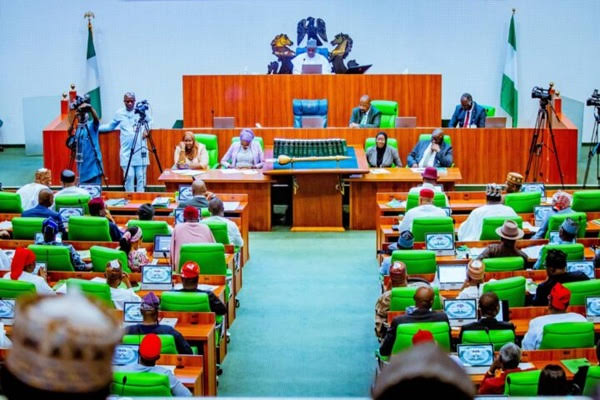News Investigators/ The House of Representatives on Wednesday stepped down all the bills transmitted from the Senate for concurrence in the House.
The News Agency of Nigeria (NAN) reports that the resolution was taken after heated debates on what was termed undue delay of bills transmitted to the senate for concurrence.
Consequently, the house stepped down two bills sponsored by the Senate Leader, Sen. Opeyemi Bamidele.
The resolution was sequel to the motion raised by the Minority Leader, Rep. Kingsley Chinda, when asked to send a senate bill seeking to amend the Federal Orthopedic Hospital Management Act.
NAN reports that the amendment act seeks to establish Federal Orthopedic Hospital at Obokun in Osun.
The House Leader, Julius Ihonvbere, also moved a motion to step down the second bill which sought to establish Federal University of Medicine and Medical Sciences in Egbe, Kogi.
NAN, however, reports that there was a rowdy session when Chinda was called by Speaker Abbas Tajudeen to second the motion for second reading.
Chinda frowned at what he called the ‘uncooperative disposition’ of the senate toward the bills transmitted by the house for concurrence.
Chinda, while stressing the imperatives of reciprocity, said: “I regret that the senate has failed in that regard, but we don’t get that same treatment at the senate.
“Mr Speaker, having said so, I will reluctantly second the motion for the second reading of this bill, sir; I so second.”
Contributing, Rep. Awaji-Iniombek Abiante said that he had two bills pending for concurrence at the senate.
“The same thing happened to my bills in the Ninth Assembly where, throughout that assembly, senate did not consider the bills that were passed from the house, emanating from me.
“I do not know how we will continue with this kind of relationship, Mr Speaker.
“Well, let it not look as if we are slowing down the progress of governance in this country. I will support, today, that we should step down the consideration of this bill. We should step it down.
“And probably you will find out from them what the problems and the challenges have been. Why do they not consider bills coming from the House of Representatives?
“And if the reasons are not cogent enough, we should reciprocate. We should reciprocate. My submission,” he said.
In his contribution, Rep. Ahmed Jaha expressed displeasure over what he called the undue reluctance of the senate in considering the legislations transmitted by the house over the years.
Jaha suggested that the Rules and Business Committee of the House be directed to liaise with the Rules and Business Committee of the senate and sign a deal.
“They have done that several times in the past. So it is better we make it verbatim that, if they do not do our own, in the next meeting we are not going to do their own.
“Let there be tit for tat. Yes, let there be tit for tat, because the house of representatives is an institution that cannot be compromised with the senate and vice versa. So this is my position,” he said.
Affirming the non-reciprocity of the senate toward the bills by the house, Speaker Abbas Tajudeen described the development as ‘very worrisome’.
“From what the clerk told me, we have 146 bills that are with the senate. I, as a person, have more than 10 bills; some are there for more than six months; no attention.
“We don’t know what is really happening. We don’t know what is happening. Let me allow one or two people to speak and then we will take a decision concerning that,” he said.
One of the lawmakers, Rep. Ahmed Satomi, who frowned at the senate’s ‘unpleasant relationship’ with the house, supported the call to step down the senate bills pending a proper resolution.
“If a bill is commissioned, and so also to work, if possible, with our standing orders that we should be guided by certain time and period that they must do the concurrence.
“If not, we assume that it has been accepted and passed. Maybe, if that is possible,” he stated.
Consequently, the speaker ruled that bills from the senate would receive the same treatment from the house, unless there were cogent reasons for any delay.
NAN
